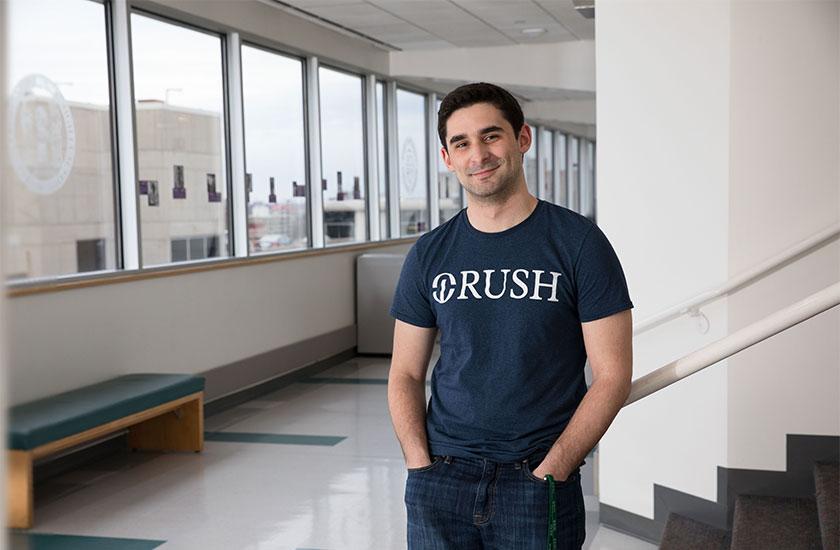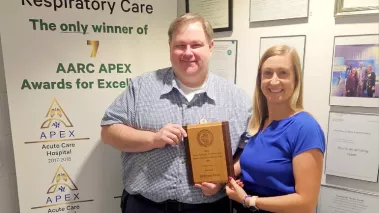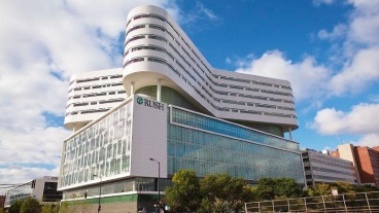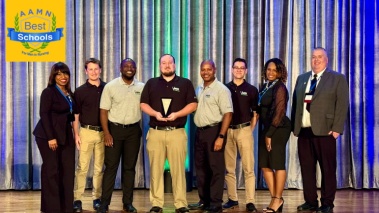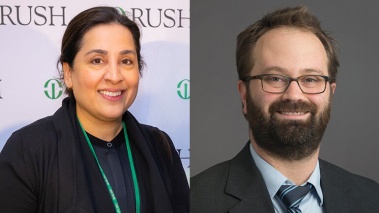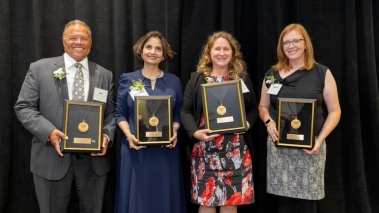A gap year wasn’t part of Emil Maric’s original plan. Rather, Maric — who received his bachelor‘s degree from Illinois Wesleyan, in Bloomington, Illinois, last spring — hoped to jump right into medical school after graduation and a summer break. The only problem: He didn’t receive an acceptance letter.
After some introspection and honest reflection, Maric realized why. He needed to acquire more of the relevant experience desired by many medical schools. With that in mind, Maric found what he calls his stepping stone to medical school: the one-year accelerated biotechnology master of science program offered at the Graduate College at Rush University.
Below, Maric describes how he came to realize that this program offered him the greatest chance of pursuing his dream of becoming a physician.
What brought you to Rush?
Originally, I applied to medical school and didn’t get in. In retrospect, that wasn’t too surprising. I went into the application process at full throttle during college, assuming I’d get in somewhere but not really considering the quality of my application or my experiences.
I put my ego aside, looked at my application and realized that I lacked a strong research and U.S. volunteering background. In fact, I had no research experience prior to coming to the Graduate College, and I hadn’t volunteered here in the U.S. at all.
A biotechnology degree in the Graduate College at Rush University offered me the opportunity to fill those gaps.
What’s attracted you to science in the first place?
My interest in science and how bodies work came at an early age, and I always wanted to help people in a meaningful way. As a teen, I volunteered on mission trips in Honduras and in the Dominican Republic. I had the opportunity to help clinical teams and saw how needed doctors were in rural areas.
I remember one day that had a big impact on me. As I helped clean instruments following a medical procedure, a man walked up to me and said thank you to me in English, which wasn’t his native language. I knew right then that we were making a difference, and I wanted to become a doctor.
A recent experience helped affirm this aspiration. My aunt, who lived in Bosnia and Herzegovina, died from colon cancer the week after I came to Rush, and my parents went there immediately. We have visited Bosnia and Herzegovina regularly since moving to the U.S. when I was about 3. During my visits there, I’ve seen an extremely poor country that is ravaged by poverty and corruption. Even some doctors are corrupt.
When my parents arrived, they found that my aunt couldn’t get the appropriate care from doctors because she wasn’t rich and couldn’t pay the doctors off. That sort of corruption pushes me to want to help people in third world countries as well as in the U.S. as a physician. I want to help those who don’t have access or insurance.
Describe your volunteer experiences since coming to Rush.
I volunteer at a Cook County jail right now through Rush University. I’m a student facilitator of health education classes, and I’m paired with medical students who lead the classes. In the classes, we address topics such as diabetes and cancer, which is clearly a need. We recently did a program on men’s health, and I was so surprised by the questions that were asked. For example, questions about sexually transmitted diseases indicated that there was a fair amount of misinformation surrounding transmission and prevention.
I also volunteer at a hospice. This experience has really been illuminating and shows a different side of medicine. Here, it’s about letting people die in a humane way, letting them die in a serene setting with loved ones if possible. This experience has really helped me see medicine in a new way, with doctors helping people die in peace.
Tell me about your projects in the biotechnology program.
Well, we are digging into our capstone research projects right now. With a partner, I’m testing different assays for calcium deposits in tissues to evaluate their effectiveness looking at Peyronie’s disease. And we recently finished a class that taught us how to implant saline pumps and approaches to surgeries that prevent excessive bleeding and damage to tissues. These are all techniques I hope to apply as a physician.
Any tips for future students?
If your plan is to go to medical school, I suggest taking a gap year and pursuing a degree or experience that will be applicable to medical school. My situation wasn’t unique; I don’t think most people get into medical school right after college. Pursuing a master’s degree like the one offered through the biotechnology program at Rush can make a difference. We study topics that translate well to the field of medicine, such as organ and immune systems, tissue biology and pharmacology.
And when you go to a school like Rush, you are exposed to volunteer opportunities that can deepen your interests in serving communities in addition to strengthening your medical school applications down the line.
Find yourself a stepping stone. I was upset when I didn’t get into medical school right away, but now I look at this master’s program — my stepping stone — as the best thing to have happened to me.

